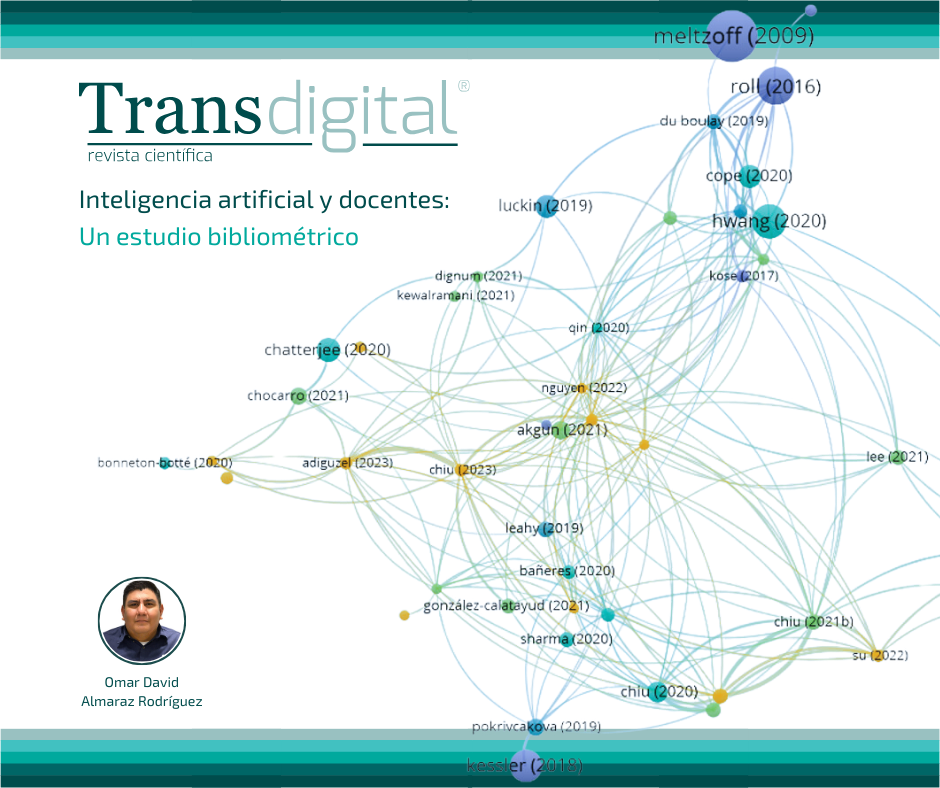Inteligencia artificial y docentes
Un estudio bibliométrico
DOI:
https://doi.org/10.56162/transdigital279Palabras clave:
docentes, análisis bibliométrico, inteligencia artificialResumen
Se realizó un análisis bibliométrico con 897 artículos de investigación sobre inteligencia artificial y docentes, utilizando los resultados emanados del metabuscador Dimensions. El conjunto de datos obtenidos se analizó con Bibliometrix y con Vosviewer, con el objetivo de proporcionar información sobre las tendencias de investigación sobre la inteligencia artificial y los docentes. Como principales resultados se obtuvo que la investigación en esta área del conocimiento va desde 1978 hasta 2023. Se identificaron tendencias clave, como el notable aumento de investigaciones a partir de 2018 y la predominancia de publicaciones en revistas como Education and Information Technologies, Sustainability, e International Journal of Emerging Technologies in Learning. A nivel geográfico, China lidera la investigación en este ámbito, seguida por Estados Unidos y España. A pesar de la vasta producción, existen brechas geográficas evidentes en países como México, mostrando una participación limitada. Los autores más destacados en este campo provienen predominantemente de Asia, con Chai Ching Sing y Thomas Chiu siendo figuras centrales en la discusión. A través de un análisis de coautoría y citación, se identificaron obras seminales que han influenciado las direcciones actuales de investigación. En conclusión, este estudio ofrece una panorámica amplia y detallada de la relación entre la inteligencia artificial y docentes, subrayando áreas de interés y oportunidades futuras para investigadores y educadores.
Citas
Adiguzel, T., Kaya, M. H., & Cansu, F. K. (2023). Revolutionizing education with AI: Exploring the transformative potential of ChatGPT. Contemporary Educational Technology, 15(3), ep429. https://doi.org/10.30935/cedtech/13152
Ahmad, S. F., Alam, M. M., Rahmat, M. K., Mubarik, M. S., & Hyder, S. I. (2022). Academic and Administrative Role of Artificial Intelligence in Education. Sustainability, 14. https://doi.org/10.3390/su14031101
Bañeres, D., Rodríguez, M. E., Guerrero-Roldán, A. E., & Karadeniz, A. (2020). An Early Warning System to Detect At-Risk Students in Online Higher Education. Appl. Sci, 10, 4427. https://doi.org/10.3390/app10134427
Celik, I., Dindar, M., Muukkonen, H., & Jarvana S. (2022). The Promises and Challenges of Artificial Intelligence for Teachers: a Systematic Review of Research. TechTrends 66, 616–630. https://doi.org/10.1007/s11528-022-00715-y
Chiu T. K. F., Xia Q., Zhou X., Chai C. S., & Cheng M. (2023) Systematic literature review on opportunities, challenges, and future research recommendations of artificial intelligence in education. Computers and Education: Artificial Intelligence, 4(1). https://doi.org/10.1016/j.caeai.2022.100118
Du Boulay, B. (2019). Escape from the Skinner Box: The case for contemporary intelligent learning environments. Br J Educ Technol, 50, 2902-2919. https://doi.org/10.1111/bjet.12860
Hwang, G. J., Xie, H., Wah, B. W., & Gaševi?, D. (2020). Vision, challenges, roles and research issues of Artificial Intelligence in Education. Computers and Education: Artificial Intelligence, 1, 100001. https://doi.org/10.1016/j.caeai.2020.100001
Kessler, G. (2018). Technology and the future of language teaching. Foreign Language Annals. 51, 205–218.
Meltzoff, A., Kuhl, P., Movellan, J., & Sejnowski, T. (2009). Foundations for a new science of learning. Science, 325(5938), 284-288.
Nguyen, A., Ngo, H.N., Hong, Y., Thi B. (2023). Ethical principles for artificial intelligence in education. Educ Inf Technol, 28, 4221–4241. https://doi.org/10.1007/s10639-022-11316-w
Pokrivcakova, S. (2019). Preparing teachers for the application of AI-powered technologies in foreign language education. Journal of Language and Cultural Education, 7(3), 135-153. https://doi.org/10.2478/jolace-2019-0025
Raif, R. (1978). Toward an applied science of education: Some key questions and directions. Instr Sci, 7, 1-14.
Roll, I., & Wylie, R. (2016). Evolution and revolution in artificial intelligence in education. International Journal of Artificial Intelligence in Education, 26(2), 582-599. https://doi.org/10.1007/s40593-016-0110-3
Tirado, S., Navío, M., O’Connor, P., & Cózar, R. (2023). From Human to Machine: Investigating the Effectiveness of the Conversational AI ChatGPT in Historical Thinking. Education Sciences, 13(8), 803. https://doi.org/10.3390/educsci13080803
Van Raan, A. (2003). The use of bibliometric analysis in research performance assessment and monitoring of interdisciplinary scientific developments. TATuP - Zeitschrift für Technikfolgenabschätzung in Theorie und Praxis, 12(1), 20–29. https://doi.org/10.14512/tatup.12.1.20

Autor de correspondencia
El autor de correspodencia se identifica con el siguiente símbolo: *Publicado
Cómo citar
Número
Sección
Categorías
Licencia
Derechos de autor 2024 Omar David Almaraz Rodríguez

Esta obra está bajo una licencia internacional Creative Commons Atribución 4.0.
Todos los artículos en Transdigital están licenciados bajo Creative Commons Attribution 4.0 International License Los autores poseen los derechos de autor y conservan los derechos de publicación sin restricciones.









